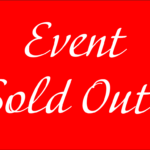And so ends the Salisbury History Festival 2024. The festival was organised by Fisherton History Society and once again all the events were completely sold out – not bad for a festival that receives no funding and is fully sponsored from within.
Monday 26th August introduced an event in conjunction with the Artisan Wine Shop in Winchester Street and The Old Ale House in Crane Street. Simon Jackson kicked of the proceeding with a presentation charting ‘Beer – Past and Present’. Simon was well qualified to host this talk as he is a Master Brewer and Fellow of the Institute of Brewing and Distilling (IBD) with over 40 years experience in the brewing sector. All aspects of the brewing industry were included in Simon’s presentation – it also included beer tasting/matching which was greatly appreciated by those present!
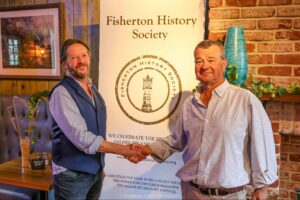
Frogg Moody (left) welcomes Simon Jackson to Salisbury History Festival
followed by the ‘Lost Pubs of Salisbury’ guided walk.
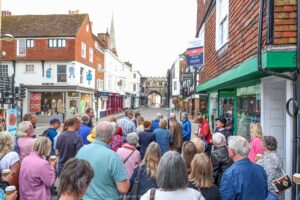
Photographs © Spencer Mulholland
Following on from Simon’s talk was a guided walk by Timezone Tours charting a selection of ‘The Lost Pubs of Salisbury.’ It soon became very apparent that Salisbury has lost a considerable number of pubs over the years including 5 in the High Street alone. The famous George Inn which had its ground floor demolished to make way for the entrance to the Old George Mall in the late 1960s, and the Crown Hotel, once a Mecca for travellers to Salisbury in the 1930s, are sadly no more. Heading towards St. Thomas’ Square we lamented the loss of ‘The Shoulder of Mutton’, The Vine’, and the Maidenhead Inn. Other lost pubs mentioned included, ‘The Chough’, ‘Blue Boar Inn’, ‘Saracens Head’, ‘The Plume of Feathers’, ‘The Wheatsheaf’ and ‘The Roebuck’. The evening concluded with a supper of burgers and chips back at Old Ale House with the general consensus being, “When are we doing it again!”
Tuesday 27th August was a private tour again highlighting ‘The Lost Pubs of Salisbury’ – although much longer than the evening before. It also included a visit to the ‘Secret Bar’ at the Haunch of Venison hosted by Ruby Vitorino Moody. Ruby is the author of the excellent book, ‘The Haunch of Venison A to Z’ and the foremost expert on this historic and iconic pub.
Wednesday 28th August continued with the theme of pubs with an event in conjunction with The Boston Tea Party who provided a wonderful cream tea in the atmospheric upstairs room of what was once The George Inn. Ruby Vitorino Moody gave the early history of the ‘George’ explaining the importance of this grand old establishment. Ruby pointed out many historical features and carvings within the George Inn and she included details of the iconic bay windows overlooking the High Street. She also charted other drinking places, now long gone, which at one time made up a large part to the High Street. Frogg Moody then gave some early examples of the food and lodging a traveller might have expected on a visit to the George in the 1700s. Pike pickled in Claret, Bream Pie, Roast Game cooked with a large assortment of spices etc, were all cooked up for guests who took up residence in one of the 13 large chambers which occupied the inn. Matt Pike finished the proceedings by highlighting some of the famous travellers who have visited the George Inn over the years. The diarist Samuel Pepys visited Salisbury in 1668 and stayed at the George Inn, ‘where lay in silk bed; and very good diet’, on his way to Stonehenge. Other famous guests known or believed to have stayed at the hotel included Oliver Cromwell, William Shakespeare (and his strolling players who are said to have performed a “As You Like It” in the Inn’s courtyard) and Buddy Holly who performed in Salisbury in 1958.
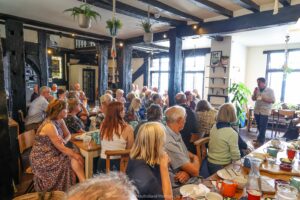
The packed Boston Tea Party Photo © Spencer Mulholland
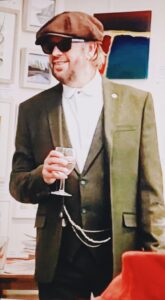
Frogg Moody at Salisbury Library – Photo © Alan Crooks
Thursday 29th August Salisbury Library was the location for Frogg Moody’s talk on the Peaky Blinders. Frogg started by giving details of the critically acclaimed production on TV and continued by explaining how the Peaky Blinders street gang of Birmingham had all but died out by 1910. Billy Kimber, who fronted the Birmingham Boys Gang, soon realised that there was rich pickings to be had at northern race track meetings by blackmailing the bookkeepers. He then encroached into the southern circuit which was already being exploited by London’s Sabini Gang and this lead to the rival gangs creating havoc at race track meetings during the 1920s by fighting each other and anyone who stood in their way. Frogg showed how Salisbury race track was not excluded from London’s Sabini Gang who, in an effort to avoid being arrested by local policemen, caused mayhem near Salisbury Train Station. The disgraceful violence spilled over into Fisherton Street with several police constables needing hospital treatment to which the gang received prison sentences.
Friday 30th August saw the much anticipated Retrial of William John Storer at the Old Oak Court in Salisbury Guildhall. The Retrial was written by George Fleming and performed by his group, History at Large. In 1865, Thomas Blake was a successful Surgeon Apothecary, with a prosperous chemist’s business in Castle Street, Salisbury. With him, in Castle Street, lived his second wife, Elizabeth, and his daughter Emily Sophia, an attractive and popular 19 year old. A third member of the household was a “living-in” assistant, William Storer. He was 27 years old. Storer and Emily became attached and eventually he asked her father’s permission to propose marriage to her. To the chagrin of both, Thomas refused. Relations between the two men obviously became strained and eventually, after a successful year’s work together, Storer was dismissed as unsuitable, on various grounds. Emily was upset, understandably, but appeared to get over it! Then – the tragedy! A month after Storer’s departure, the Blake’s were disturbed by Emily’s frantic screaming from her bedroom. They found her in agonised convulsions and in spite of Blake’s own medical skills and the presents of two of Salisbury’s leading doctors, Emily died two hours later. It was established that she had been poisoned by overdosing on pills containing the deadly poison, strychnine. These had been made up for her by Storer shortly before he left and he was arrested and jailed, pending trial for manslaughter – and possibly murder – but was he guilty? In this production, the audience was the jury and after hearing all the evidence they had to find him guilty or not guilty! I have to report that William John Storer was unanimously found not guilty!
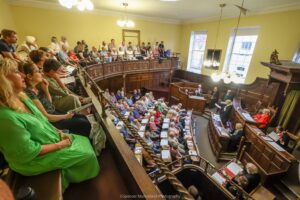
The packed Old Oak Court at Salisbury Guildhall at the Retrial of William Storer
Photograph © Spencer Mulholland
Saturday 31st August saw the final event of a really enjoyable week. The United Reformed Church in Fisherton Street was the location for a whole day of historical talks and presentations featuring Neil Beagrie, Christine Mason, Ruth Butler and Paul Sample. First off was Neil who presented ‘A Hidden Gem: The Archaeology and History of Bourne Hill Gardens’. Neil has lived near the gardens for over 30 years and he gave a fascinating talk on the Saxon, Medieval, Georgian and Post-Modern landscape of this often overlooked corner of Salisbury. Built on the site of the former St Edmund’s College, Neil explained how the garden incorporates the earthwork remains of part of Salisbury’s City Rampart’s. A tablet of 1927 wrote “within these grounds stood the college of St Edmund 1268-1546. This house was built in the early C18 by the Wyndam family. The house and grounds were purchased by the Corporation of New Sarum in 1927 to commemorate the 700th anniversary of the granting of the 1st charter to the City and are thus preserved for the benefit and use of the Citizens.”
Christine Mason then presented her talk, ‘Fanny Nelson – The Hero’s Wife’. In late June 1801 Frances, Lady Nelson was informed that her husband, Vice Admiral Lord Nelson, having been released from his post as Commander-in-Chief in the Baltic, was shortly expected home in Britain. She had not seen him for six months and, during that time, Nelson had made it clear that he considered their marriage was at an end. Christine’s presentation certainly gave an excellent account of Fanny Nelson, Lord Nelson’s first wife, whose life has been overlooked due to Nelson’s affection for Lady Emma Hamilton. This talk certainly made one aware that Nelson had treated Fanny in a cold and ungentlemanly manner once Emma had taken his affection. In public, Emma Hamilton was critically resentful of Fanny in open conversation. Christine said, “Although there are certain gaps, so much documentation of that period survives in personal letters and of course navel records, it is almost possible to present her story in her words and those people closely connected to her.”
Ruth Butler is no stranger to the Salisbury History Festival having appeared as a speaker on two other occasions. For her latest outing she regaled us with ‘The World Turned Upside Down – Wiltshire and the English Civil Wars’. Ruth works at the Wiltshire and Swindon History Centre and was able to illustrate her presentation with documents discovered in their archives. Hence we learnt about the 1642 civil war between King and Parliament. Salisbury mostly escaped the fighting but in 1644 a Royalist army occupied the town but was quickly defeated by the Parliamentary army. A year later another Royalist army attacked Salisbury and drove out the Parliamentary troops – the town remained under the Royalists until 1646 when the King withdrew his troops. Ruth also related the story about the Salisbury bell tower which was once located in the Cathedral Close – this was set on fire by Royalist soldiers.
Paul Sample finished the proceedings with his presentation, ‘The Causes, Course and Consequences of The Battle of Pyt House (1830)’. Paul’s talk highlighted a series of uprisings of agricultural labourers, which took place across the country reacting against farmers and landowners which often resulted in the destruction of farm machinery. The riots spread under the instigation of the mythical ‘Captain Swing.’ Angry and frustrated about their increasingly poor working conditions, falling wages and job losses, the labourers took to the streets and rioted in protest. Paul gave a fascinating account of the pitched battle between labourers and the Hindon troop of the Wiltshire Yeomanry which happened at Pyt House in 1830. One of the labourers lost his life as a result of this sad affair and the rioters from north Dorset and Wiltshire were tried at Salisbury Guildhall – some were eventually transported to Tasmania for life. Paul gave details of a plaque which was unveiled at Salisbury Guildhall in 2009 to commemorate the trials of rural workers who took part in the “Swing Riots” of 1830.
In conclusion, Fisherton History Society would like to thank the many people who helped to make the 2024 Salisbury History Festival such an enjoyable and educational occasion. Our thanks go to the Salisbury Journal for publicity, Mike Wren for building the FHS website, Alex King for designing the FHS logo, Spencer Mulholland for photography and encouragement, Jo and Russ at the Rocketship Bookshop, Patrick at the History Bookshop, Alyn at Spectrum Printers Wilton, Catherine Street Printers, Speedyprint Printers, Liz and the staff at Artisan Wine Shop, Shane and his staff at The Old Ale House, Simon Jackson, Jo Osgood and the young Wilton WI, The Haunch of Venison, Jojo and the staff at the Boston Tea Party, Ruby Vitorino Moody, Matt Pike, Philip and the staff at Salisbury Library, Graham and Luke plus the staff at Salisbury Guildhall, George Fleming and the cast of History at Large, Studio Theatre, Rob Wood and his bar staff, Chris Portnall and all at the United Reformed Church, Neil Beagrie, Christine Mason, Ruth Butler, Paul Sample, Ian Green for operating the visuals, Neil & Tina Leacy for support and the loan of visuals, Annette Beverage at Inside Salisbury for publicity and filming, Maggie Burns for additional filming, and Fiona Crowther, Jan Stanbury, Vicky Nothcote and Glenda Pike for their organisational skills and for keeping me on the straight and narrow!
Finally to everyone who came and supported this year’s event – thank you!
About Salisbury History Festival
Salisbury History Festival is a celebration of Salisbury and it’s people. It is organised as part of the Fisherton History Society and began life in August 2018 with 5 days of events, including seminars, historical presentations, guided walks and films.
Since the success of our first history festival, the event has grown and now includes partnerships with other local organisations such as Wiltshire Creative, Timezone Productions and History At Large.
Salisbury History Festival offers a fascinating insight into the city’s past and includes leading local history research – we show how history has influenced Salisbury from past events.
A key element of our commitment is to promote awareness of Salisbury’s past to new audiences.
You may be surprised at just how relevant the Festival’s events are to Salisbury today.
Social history research makes a difference. From big ideas to the most detailed observations, social history affects us all everyday – at work, in school and within our communities.
Details of this year’s festival will appear on this website.
Please visit this website for regular updates listing details of festival events.
Purpose of the Festival
* The Festival is designed to promote, and increase awareness of Salisbury’s past social history.
Each year the Festival
*Presents events throughout the in conjunction with other organisations
* Offers five days of activities celebrating the history of Salisbury and its people.
* Continues to increase the number of events focused on engaging the public and young people
via local history research.
* Gives an award to an individual who has made an outstanding contribution to local history.
Aims of the Festival
* Encourage, support and create the opportunity for social history researchers to engage with non-academic audiences.
* Promote and increase awareness of Salisbury’s past history.
* Enable the public to engage with research.
* Engage with our delegates via face to face contact with historical presenters and lecturers.


